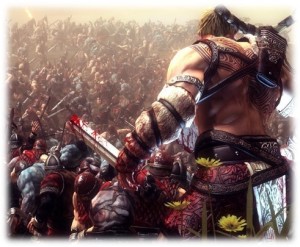DEUTERONOMY 2: BARBARIC GENOCIDE
To understand even a part of a fraction of our Maker’s thinking and actions, it’s worth firmly accepting that there’s a bigger picture to the scene that you are looking at. Just like a Shakespearean play with many Acts and many scenes within an Act, this epic storyline that I am taking you through this year in my Breadcrumbs, has 66 Acts (66 books in the Hebrew Bible) and many scenes within each Act (each scene is a chapter in that book). Deuteronomy is the 5th book in the Bible and it has 34 Chapters. So, today’s chapter is Act 5 Scene 2. Likewise, if you like jigsaw puzzles, every puzzle piece that we look at in my Breadcrumbs, must be clipped into the puzzle pieces around it and understood within the block of pieces that it belongs to. Even that patch of puzzle is still incomplete if it’s not then clipped into the 3D global puzzle that our Maker has handed to us.
this epic storyline that I am taking you through this year in my Breadcrumbs, has 66 Acts (66 books in the Hebrew Bible) and many scenes within each Act (each scene is a chapter in that book). Deuteronomy is the 5th book in the Bible and it has 34 Chapters. So, today’s chapter is Act 5 Scene 2. Likewise, if you like jigsaw puzzles, every puzzle piece that we look at in my Breadcrumbs, must be clipped into the puzzle pieces around it and understood within the block of pieces that it belongs to. Even that patch of puzzle is still incomplete if it’s not then clipped into the 3D global puzzle that our Maker has handed to us.
If you think this is complicated, neither quitting nor disinterest is the answer! For the sake of your eternal future, I wholly recommend that you start at the beginning, reading manageable portions at a time and asking your Maker to ‘speak to you’ through it. I can 100% guarantee without a shadow of doubt that if you don’t willfully reject Him and His Word (Free Choice is embedded in your design, so the choice is yours), you will have not just His words but a relationship with Him by the time you get to the end of the 66 Acts in His epic Play.
That said, its worth knowing the background to our modern-day disapproval of people moving in and taking over other people’s land. Believe it or not, our sense of right/wrong, especially in the so-called Christian West, was first established on biblical law.  Father God set up the boundaries.[a] However, since He is God over His own images of Himself (us), by His wisdom and because He has understanding, He can equally disinherit nations.[b] Knowing this, helps us understand the reshuffle of the land in the region in today’s chapter. However, our Maker doesn’t do random. So, How and Why are essential for understanding Who He is, What He’s up to, and Where any of this connects with me today. To answer this, several things can be noted…
Father God set up the boundaries.[a] However, since He is God over His own images of Himself (us), by His wisdom and because He has understanding, He can equally disinherit nations.[b] Knowing this, helps us understand the reshuffle of the land in the region in today’s chapter. However, our Maker doesn’t do random. So, How and Why are essential for understanding Who He is, What He’s up to, and Where any of this connects with me today. To answer this, several things can be noted…
-
Our Father God has given promises to more than one group. His epic storyline is focused on the Children of Israel but His integrity will see Him stick to every promise He has ever made to anyone. For example, Esau [v4] is Jacob’s brother[c] and Jacob was renamed Israel.[d] So, the people in v4-7 are cousins to these Children of Israel. Nothing of their ground was to be taken not even the treading of a sole. [v5] Likewise, no land was to be taken from the descendants of Lot [v9 & 19], the nephew of Abraham[e], another cousin of the Children of Israel. So then, Father God isn’t a conquering tyrant. He’s moving an entire nation into position [v2-3] for receiving promised land as an inheritance that He is reassigning to them. When you inherit land, it’s difficult to why the reshuffle?
-
There is a story behind the story. What is happening before our eyes, has a background. Life didn’t start with us and we can’t process our Creator through 21st Century eyes. There were people groups long before and For example, He already dispossessed a group to give land instead to Moab. [v9] The Emim lived there formerly, a people as Like the Anakim, they are also regarded as Rephaim, but the Moabites call them Emim. [v10] The sons of Esau destroyed the Horites. [v12] Rephaim formerly lived in the land of Ammon, great, numerous, and tall as the Anakim. but the Ammonites who disposed and destroyed them called them Zamzummin. [v20-21] And the Avvim, who lived in villages as far as Gaza, were destroyed by the Caphtorim who came from Caphtor (Crete). [v23] And in v24-37 the Children of Israel are commissioned to dispossess and destroy this last cluster of this ancient people group. Read more about this in tomorrow’s Breadcrumb. Suffice to say, from the little we know of this super race[f],
 they gained ‘renown’ but were not good people.[g] To allow an incubation of concentrated wickedness to fester and grow in this region would: (i) not have been just for the victims[h]; and (ii) for all we know, allowing them to continue unchecked may have risked even what we have today if it had not been decisively stopped.
they gained ‘renown’ but were not good people.[g] To allow an incubation of concentrated wickedness to fester and grow in this region would: (i) not have been just for the victims[h]; and (ii) for all we know, allowing them to continue unchecked may have risked even what we have today if it had not been decisively stopped. -
Father God doesn’t show partiality nor is He hypocritical. If there is right and wrong, there’s judgement and His people are judged with the same measuring stick as everyone else. [v14-18] The difference is that He wants His family in a place where they are capable of standing up for what is right [v25], displaying to the world what is right living – to live in His likeness[i] – then disciplining others only when they themselves are disciplined.
-
We behave in the way that Father God has behaved with us. [v7] Father God has known our wanderings throughout this great wilderness – life on Planet Earth with all it’s ups and downs. And if we wish to take stock, He has provided so that we have survived to this point. If we trust in His lead, He will take care of what we don’t have and what we need.
If I stick with the storyline that goes beyond today’s chapter and not throw the baby out with the bathwater after reading v34, then just two books later is a battle against the Canaanites and Perizzites, where a man named Adoni-Bezek says, “Seventy kings with their thumbs and big toes cut off have picked up scraps under my table. Now God has paid me back for what I did to them later.”[j] Even they at the time knew, and bore permanent witness to, what was happening to them: that they were receiving their ‘just deserts’. Whatever I can make of it using my 21st Century eyes, Faith from this point on includes understanding and accepting that I am only an image of my Father God, I am not God Himself; and if I’m to exercise real Faith, I need to respect God as God. I wonder if that’s not all He ever wanted from us…
CLICK to return to today’s “Daily Breadcrumbs”
[a] Deuteronomy 32:8; Psalm 74:17; Acts 17:26
[b] Isaiah 10:13
[c] Genesis 25:19-34; 26:34-28:9; 32:1-33:20
[d] Genesis 32:27-28
[e] Genesis 12:1-5; 13:5-18; 14:8-16; c19
[f] Deuteronomy 3:11; 1 Samuel 17:4-7; 1 Chronicles 20:4-8
[g] Genesis 6:1-6; 18:20-21; c19
[h] Genesis 18:25
[i] Genesis 1:26-28
[j] Judges 1:1-7